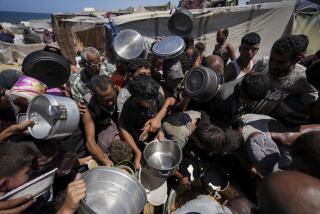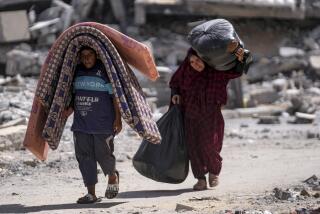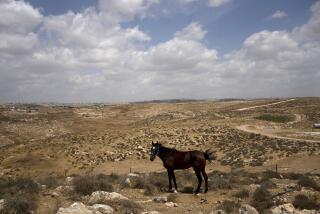Israel to Move Ahead on Barrier
JERUSALEM — Prime Minister Ariel Sharon on Sunday ordered construction to continue on a separation barrier Israel is building in the West Bank, as he rejected as “immoral and dangerous” last week’s world court ruling calling for the divider to be demolished.
Sharon’s comments, his first public remarks on the matter since the court issued its nonbinding decision late Friday, came two hours after a bomb planted by Palestinian militants exploded at a Tel Aviv bus stop, killing a 19-year-old soldier and injuring at least 20 other people.
“This morning’s act of murder is the first to have occurred under the auspices of the opinion of the International Court of Justice in The Hague,” Sharon said at the opening of his weekly Cabinet meeting.
Sharon dismissed the court’s opinion as biased and politically motivated, saying the judges did not fully consider Israel’s position that the barrier in and around the West Bank was needed to keep out suicide bombers.
The planned 437-mile project -- consisting of wire fences, concrete barriers, patrol roads and surveillance equipment -- is about one-third finished.
Israeli security officials have credited the completed sections, mainly along the northern West Bank, with contributing to a significant drop in suicide bombings originating from those areas.
Israeli authorities said no suicide bomber was involved in Sunday’s attack. Instead, they said, the bomb apparently was concealed in bushes near a bus shelter along a busy corridor in the southern section of Tel Aviv and then detonated as Israelis hurried to their jobs at the start of the workweek.
Maayan Naim, a female soldier, was killed in the attack, Israeli military officials said. At least 20 other people were injured. Several remained hospitalized Sunday with injuries described as moderate to serious.
In the emergency room at Ichilov Hospital in Tel Aviv, tears streamed down the cheeks of Sami Masrawa, a 29-year-old chef in Jaffa who is an Israeli Arab. Masrawa described trying to save the young soldier by lifting her head off the pavement and moving her tongue so it would not obstruct breathing. He said he checked for her pulse repeatedly, but there was none.
“I did not think about being an Arab -- it was my emotions that were working,” said Masrawa, who survived a suicide attack in Tel Aviv eight years ago and now works for peaceful coexistence between Jews and Arabs. “I so much wanted her to be alive.”
Masrawa said the attack had altered his view of the West Bank barrier, and he now supported it.
The bombing was the first in Israel in nearly four months, the longest such lull since the current conflict erupted in September 2000.
The Al Aqsa Martyrs Brigade, an armed group linked to Palestinian Authority President Yasser Arafat’s Fatah movement, claimed responsibility for the attack.
Palestinian Authority Prime Minister Ahmed Korei condemned the bombing, saying such violent acts threatened to undercut the legal victory won at The Hague.
Speaking to reporters outside Arafat’s compound in the West Bank city of Ramallah, Korei called the ruling “a wise and just legal decision.”
He said the Palestinians would work through the United Nations to have the barrier torn down.
The International Court of Justice, in saying the barrier should be removed, ruled that it violated Palestinians’ freedom of movement and amounted to an annexation of Palestinian land by Israel. The decision said that Israel’s security concerns did not justify what the court concluded were breaches of international law.
All but one of the 15 judges joined in the ruling; the lone dissenter on much of the opinion was Thomas Buergenthal, an American.
The U.N.’s General Assembly had asked the tribunal for an advisory opinion on the barrier, but has no power to impose sanctions against Israel.
That authority rests with the Security Council, where the U.S. is almost certain to exercise its veto.
The Bush administration stood with Israel in arguing that the world court lacked legal jurisdiction over the barrier.
Israel has indicated it would abide by a ruling last month by its Supreme Court that found some West Bank sections of the barrier were illegal because they infringed on the rights of Palestinians.
The military agreed Sunday to refrain from building a section around three Palestinian villages until it had reviewed plans for all uncompleted portions.
The agreement, approved by the Supreme Court, came in response to a legal challenge filed last week by Israeli groups.
In other developments, Sharon planned to meet today with Shimon Peres, the leader of the opposition Labor Party, to discuss the possibility of creating a broad unity coalition that would shore up the prime minister’s shaky grip on power.
Sharon’s government, led by his right-wing Likud Party, lacks a parliamentary majority following the departure of some allies opposed to his plans for a phased withdrawal from all 21 Jewish settlements in the Gaza Strip and four others in the northern West Bank by late next year.
Efforts to enlist Labor are sure to meet stiff resistance from Likud hard-liners. But it may be the only way to ensure Sharon’s political survival -- and his plans for evacuating settlements -- without risking new elections.
*
Special correspondent Tami Zer in Tel Aviv contributed to this report.
More to Read
Sign up for Essential California
The most important California stories and recommendations in your inbox every morning.
You may occasionally receive promotional content from the Los Angeles Times.









